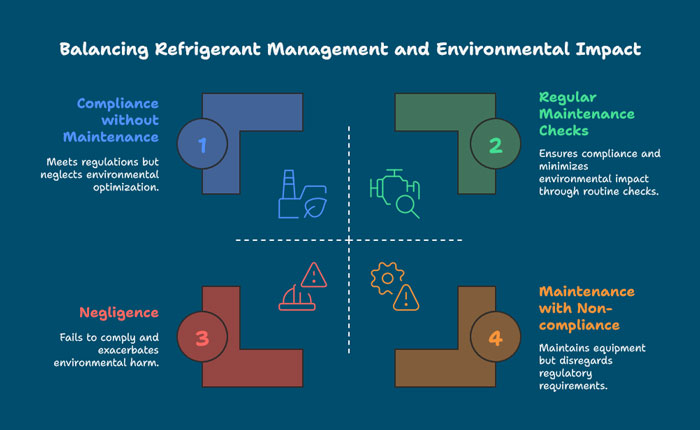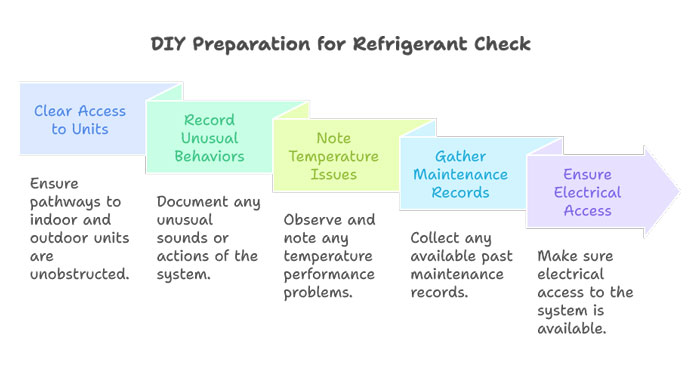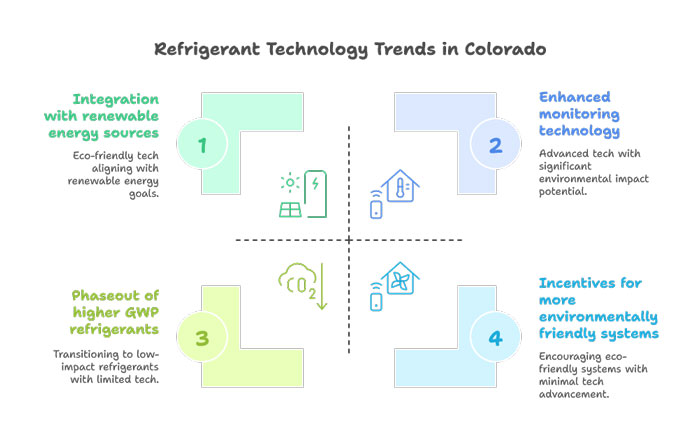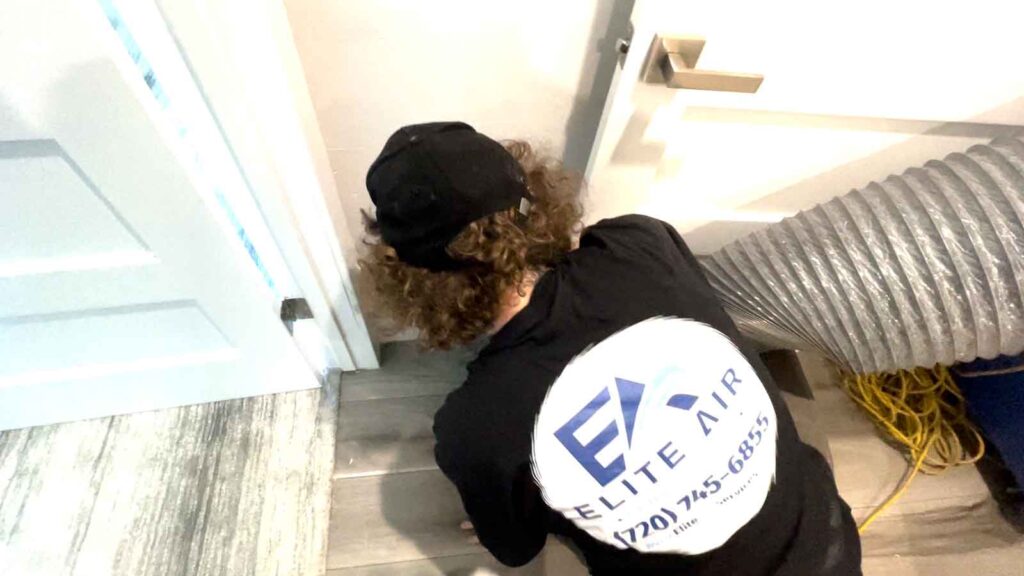Introduction to Refrigerant Services in Colorado
As a Colorado resident, you know our climate presents unique challenges for HVAC systems. From scorching summer days to frigid winter nights, your cooling and heating equipment works overtime year-round. These systems’ most crucial maintenance services are the refrigerant level check and recharge service.
“I’ve seen countless systems fail prematurely because owners neglected regular refrigerant level. In Colorado’s varied climate, your system works harder than in many other states, making proper refrigerant levels critical for efficiency and longevity.” — John, Owner of Elite Air Duct Services.
A professional refrigerant check involves inspecting your system’s pressure and temperature to ensure optimal performance. Maintaining proper refrigerant levels becomes even more critical in Colorado, where temperatures fluctuate dramatically. This comprehensive guide will walk you through everything you need to know about refrigerant services in Colorado, from understanding how refrigerant works to identifying signs of low levels and finding reliable service providers.
Understanding Refrigerant and Its Function
What is Refrigerant?
Refrigerant is a specialized compound that flows through your air conditioning and heating systems, absorbing and releasing heat as it changes states from liquid to gas. This continuous cycle is what allows your system to cool your home in summer and, for heat pumps, warm it in winter.

Types of Refrigerant Used in Colorado Systems
Several types of refrigerants are commonly found in Colorado homes and businesses:
- R-22 (Freon) – Found in older systems, being phased out due to environmental concerns
- R-410A (Puron) – Common in newer residential systems
- R-407C – Often used in commercial applications
- R-134a – Found in automotive air conditioning
- R-32 – Emerging as an environmentally friendly alternative
Colorado’s climate requires systems that can handle extreme temperature variations, making the right refrigerant choice critical. A professional refrigerant level check will identify which type your system uses and ensure it’s at optimal levels.
Signs Your System Needs a Refrigerant Check
Visual and Performance Indicators
Your HVAC system will often show clear signs when refrigerant levels are low:
- Reduced cooling or heating performance
- Longer run times to reach the desired temperature
- Ice formation on evaporator coils
- Higher than everyday utility bills
- Unusual noises from the system
Colorado-Specific Considerations
In Colorado’s climate, certain factors make level checks particularly important:
- High Altitude Effects: Denver’s mile-high elevation and other mountainous regions of Colorado affect how HVAC systems operate and refrigerant performs.
- Extreme Temperature Swings: Colorado can experience 30+ degree temperature changes daily, stressing systems and potentially highlighting refrigerant issues.
- Dry Climate Considerations: Our low-humidity environment affects system performance differently than humid regions.
The Refrigerant Level Process
What to Expect During a Professional Service
When you schedule a refrigerant check with a qualified Colorado technician, they’ll typically follow these steps:
- Inspect the entire system for visible signs of leaks or damage
- Connect gauges to measure refrigerant pressure
- Compare current levels to manufacturer specifications
- Check temperature differentials across components
- Verify proper operation of all system components
- Document findings and make recommendations
DIY Monitoring vs. Professional Service
While homeowners can watch for signs of refrigerant issues, certified professionals should perform the actual refrigerant check. In Colorado, technicians must have EPA certification to handle refrigerants legally, and specialized equipment is required for accurate measurements.
Environmental and Legal Considerations
Colorado Regulations on Refrigerants
Colorado follows federal EPA regulations regarding refrigerant handling, but also has state-specific requirements:
- Technicians must be EPA-certified to purchase or handle refrigerants
- Intentional venting of refrigerants is prohibited
- Proper recovery equipment must be used during service
- Documentation requirements for refrigerant disposal
According to Colorado’s Clean Indoor Air Act, equipment must be adequately maintained to ensure healthy indoor air quality. This includes regular level checks to prevent system inefficiency and potential air quality issues.

Environmental Impact of Refrigerants
Refrigerants can have significant ecological impacts if released:
- Ozone depletion potential (particularly older refrigerants)
- Global warming potential (GWP)
- Air quality effects
- Energy consumption implications
Maintaining proper refrigerant levels through regular checks optimizes your system and minimizes environmental impact.
Choosing a Service Provider in Colorado
Qualifications to Look For
When selecting a company for level check and recharge services, ensure they have:
- EPA Section 608 certification
- Local Colorado business license
- Proper insurance coverage
- Good standing with the Better Business Bureau
- Experience with Colorado’s unique climate challenges
- Transparent pricing for refrigerant check services
Questions to Ask Before Scheduling
Before booking your refrigerant check, ask potential providers:
- “What does your level check process include?”
- “How do you determine if a recharge is necessary?”
- “What refrigerant types do you work with?”
- “Are your technicians experienced with Colorado’s climate considerations?”
- “Do you provide written documentation of the service?”
Cost Considerations for Colorado Residents
Typical Price Ranges
In Colorado, refrigerant services vary in cost depending on several factors:
| Service Type | Average Cost Range |
|---|---|
| Basic Refrigerant Check | $75-$150 |
| Refrigerant Check with Minor Recharge | $150-$300 |
| Refrigerant Check with Major Recharge | $300-$600+ |
| Leak Detection & Repair + Refrigerant Check | $200-$1,500+ |
These ranges reflect typical pricing across Colorado’s major metropolitan areas, such as Denver, Colorado Springs, and Fort Collins. Rural areas may see higher prices due to travel considerations.
Factors Affecting Cost
Several variables influence the cost of refrigerant services in Colorado:
- System type and size
- Refrigerant type (R-410A is typically more expensive than older types)
- Amount of refrigerant needed
- Accessibility of the system
- Presence of leaks requiring repair
- Service provider’s pricing structure
- Geographic location within Colorado
Seasonal Timing for Refrigerant Services
Optimal Schedule for Colorado Homes
The timing of your level check can significantly impact system performance:
- Spring (March-May): Ideal time to prepare for summer demands
- Fall (September-October): Good time to check before heating season
- Pre-Vacation: Consider a check before extended absence
- Post-Extreme Weather: After unusual temperature events
Most Colorado HVAC professionals recommend at least annual refrigerant checks as part of regular maintenance, with bi-annual checks for older systems or those in extreme conditions.

DIY Preparation for Professional Service
Steps to Take Before the Technician Arrives
To make your refrigerant level check more efficient:
- Clear access to indoor and outdoor units
- Record any unusual system behaviors
- Note temperature performance issues
- Gather maintenance records if available
- Ensure electrical access to the system
These preparations help technicians perform a more thorough refrigerant check and quickly identify potential issues.
New Technology in Refrigerant Management
Smart Monitoring Systems
Modern HVAC technology offers Colorado homeowners new ways to monitor system performance:
- Smart thermostats that track cooling/heating efficiency
- Pressure monitoring systems that can alert to potential refrigerant issues
- Connected services that remind you of scheduled level checks
- Mobile apps that track system performance metrics
Sustainable Refrigerant Options
The industry is moving toward more environmentally friendly options:
- Lower GWP refrigerants like R-32
- Natural refrigerants for specific applications
- Systems designed for reduced refrigerant volume
- More efficient cycle designs require less refrigerant
Colorado’s focus on environmental sustainability makes these options increasingly relevant for homeowners.
Common Refrigerant Myths Debunked
Misconceptions About Refrigerant Service
Let’s clear up some common misunderstandings about refrigerant services:
Myth 1: “Refrigerant gets used up like gas in a car.” Reality: Refrigerant doesn’t get consumed during regular operation. If levels are low, there’s a leak that needs repair.
Myth 2: “Annual refrigerant recharges are normal maintenance.” Reality: While annual refrigerant checks are recommended, recharges should only be necessary if leaks are present.
Myth 3: “I can add refrigerant myself.” Reality: In Colorado, handling refrigerant requires EPA certification and specialized equipment.
Myth 4: “All refrigerants are the same.” Reality: Different systems require specific refrigerant types, and mixing types can cause severe damage.
Case Studies: Colorado Refrigerant Success Stories
Residential Success Story
A Denver homeowner noticed their system running constantly during a July heat wave. After scheduling a level check, technicians discovered a small leak and refrigerant levels at 60% of specification. After repair and proper recharge, the system’s efficiency improved by 30%, and the homeowner saw immediate savings on their energy bill.
Commercial Application
A mountain resort in Vail had been experiencing inconsistent cooling in guest rooms. A comprehensive level check revealed that the high-altitude installation required adjustments to standard refrigerant specifications. After properly calibrating the system for the elevation, guest comfort improved dramatically, and the resort reduced energy consumption by 25%.

Emergency Situations: When to Act Immediately
Red Flags Requiring Immediate Attention
Some situations warrant an emergency-level check and service:
- Complete loss of cooling or heating function
- Unusual sounds like hissing or bubbling from the system
- Oil spots around refrigerant lines (indicating possible leaks)
- Frost buildup on exterior lines during operation
- Burning smells from indoor components
In these cases, shut down your system and contact a Colorado HVAC professional immediately to prevent further damage.
Preventative Maintenance Plans
Bundling Refrigerant Checks with Other Services
Many Colorado HVAC companies offer maintenance plans that include:
- Scheduled level checks
- Filter replacements
- System cleaning
- Electrical component inspection
- Airflow testing
- Thermostat calibration
These comprehensive plans typically save money compared to individual service calls and help catch potential issues before they become significant problems.
Colorado Climate Zones and HVAC Considerations
Regional Differences Within Colorado
Colorado’s diverse geography creates distinct climate zones, each with unique HVAC challenges:
- Front Range (Denver, Boulder, Fort Collins): Wide temperature swings require systems with proper refrigerant levels to handle both extremes efficiently.
- Mountain Communities (Vail, Aspen, Breckenridge): High altitude affects refrigerant pressure and system operation, making regular refrigerant checks crucial.
- Western Slope (Grand Junction, Durango): Hot summers require optimal cooling performance, while winter temperature drops demand efficient heating.
- Eastern Plains (Sterling, Burlington): Exposure to high winds and extreme temperatures requires robust systems with properly maintained refrigerant levels.
Each region benefits from technicians familiar with local conditions and how they affect refrigerant performance.

Future of Refrigerant Technology in Colorado
Emerging Trends and Regulations
The refrigerant landscape continues to evolve in Colorado:
- Phaseout of higher GWP refrigerants
- Incentives for more environmentally friendly systems
- Integration with renewable energy sources
- Enhanced monitoring technology
Staying informed about these changes helps homeowners make forward-thinking decisions about their HVAC investments and maintenance plans, including level check scheduling.
Conclusion: Taking Action on Refrigerant Maintenance
Regular level checks are vital to HVAC maintenance in Colorado’s challenging climate. By understanding the importance of proper refrigerant levels, recognizing signs of potential issues, and establishing a relationship with qualified service providers, you can ensure your system operates efficiently and reliably year-round.
Don’t wait until your system fails during extreme weather – schedule your level check today and enjoy the peace of mind that comes with a properly maintained HVAC system.
Final Recommendations
- Schedule annual level checks as part of regular maintenance
- Work only with EPA-certified technicians for all refrigerant services
- Keep records of all refrigerant services for future reference
- Consider a maintenance plan that includes level checks
- Stay informed about refrigerant regulations and technology changes
By following these recommendations, Colorado residents can maintain comfortable, efficient homes while minimizing environmental impact and avoiding costly emergency repairs.
“In my 20+ years servicing HVAC systems across Colorado, I’ve found that regular level checks are the most effective preventative measure for extending system life and maintaining efficiency. It’s a small investment that pays significant dividends in comfort, cost savings, and environmental responsibility.” — John, Owner of Elite Air Duct Services.
More info can be found on REGULATION NUMBER 15 CONTROL OF EMISSIONS OF OZONE-DEPLETING COMPOUNDS PDF.
